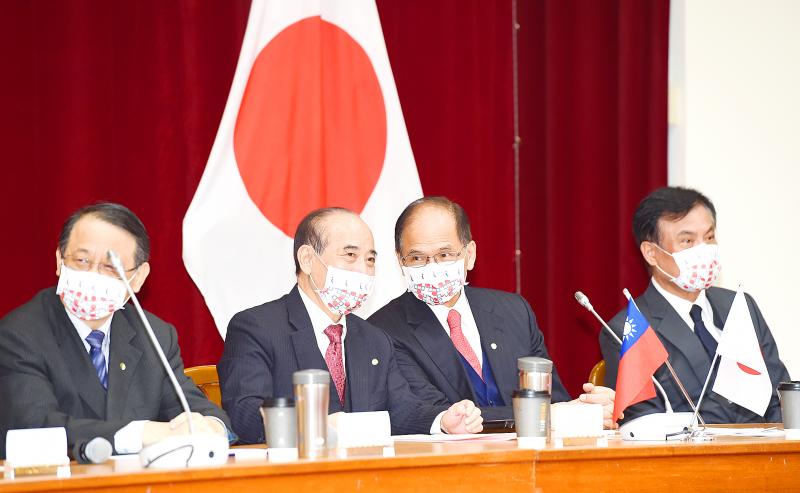The government should refer to scientific evidence when deciding whether to lift a ban on food imports from five Japanese prefectures, Legislative Speaker You Si-kun said yesterday.
You made the remarks ahead of the inauguration ceremony for the Taiwan-Japan Parliament Members Friendship Association, which comprises 95 of the 113 lawmakers in the legislature.
There has been speculation that the government plans to lift the ban it placed on food imports from the Japanese prefectures of Fukushima, Ibaraki, Tochigi, Gunma and Chiba after the 2011 Fukushima Dai-ichi nuclear power plant disaster.

Photo: Liao Chen-huei, Taipei Times
In a referendum in November 2018, a majority voted in favor of retaining the ban, but the referendum’s legality expired after two years.
Asked about the issue, You, who is the association’s chairman, said that he had not received any information from the government about lifting the ban, nor had he talked with Japanese officials about it.
Nonetheless, he would respect any decision made by the government, he said, adding that he hopes it will deliberate over the matter based on scientific evidence.
Taiwan and Japan are closely bound, especially as both are part of the first island chain, and their security affects the safety of the region, as made clear by the US’ Indo-Pacific Strategy, You said.
Taiwan People’s Party Legislator Tsai Pi-ru (蔡壁如), one of the association’s deputy chairpersons, called on the government to be discreet about the lifting the ban.
It should not repeat the poor social communication it displayed when lifting a ban on pork imports containing ractopamine, Tsai said.
Delivering his speech through video, Japan-ROC Diet Members’ Consultative Council chairman Keiji Furuya thanked Taiwan for donating more than 2 million masks and 50,000 pieces of protective clothing last year to help Japan fight the COVID-19 pandemic.
It is regrettable that Taiwan, with its outstanding achievement in containing the pandemic, cannot join the WHO due to Beijing’s objections, he said, adding that the council would continue to call attention to Taiwan.
Many Japanese lawmakers’ plans to visit Taiwan have been thwarted by the pandemic, and they are likely to take “revenge trips” to Taiwan soon after the pandemic subsides, Japan-Taiwan Exchange Association Representative Izumi Hiroyasu said in Mandarin.
This year will mark the 10th anniversary of the March 11, 2011, earthquake and tsunami that devastated coastal areas of northeast Japan, and the country has launched a new logo celebrating its friendship with Taiwan, with a series of planned events, he said, adding that he expects to see great leaps in bilateral relations this year.
Former legislative speaker Wang Jin-pyng (王金平), who serves as the association’s honorary chairman alongside former legislative speaker Su Jia-chyuan (蘇嘉全), said that the association was developed from a group he established among Chinese Nationalist Party (KMT) lawmakers in 1992, and it has now become the biggest group of its kind in the legislature.
The association should advance bilateral exchanges to manage and solve common problems, Wang said, while inviting former Japanese prime minister Shinzo Abe to visit Taiwan after the pandemic subsides.

Taiwan is stepping up plans to create self-sufficient supply chains for combat drones and increase foreign orders from the US to counter China’s numerical superiority, a defense official said on Saturday. Commenting on condition of anonymity, the official said the nation’s armed forces are in agreement with US Admiral Samuel Paparo’s assessment that Taiwan’s military must be prepared to turn the nation’s waters into a “hellscape” for the Chinese People’s Liberation Army (PLA). Paparo, the commander of the US Indo-Pacific Command, reiterated the concept during a Congressional hearing in Washington on Wednesday. He first coined the term in a security conference last

Prosecutors today declined to say who was questioned regarding alleged forgery on petitions to recall Democratic Progressive Party (DPP) legislators, after Chinese-language media earlier reported that members of the Chinese Nationalist Party (KMT) Youth League were brought in for questioning. The Ministry of Justice Investigation Bureau confirmed that two people had been questioned, but did not disclose any further information about the ongoing investigation. KMT Youth League members Lee Hsiao-liang (李孝亮) and Liu Szu-yin (劉思吟) — who are leading the effort to recall DPP caucus chief executive Rosalia Wu (吳思瑤) and Legislator Wu Pei-yi (吳沛憶) — both posted on Facebook saying: “I

Sung Chien-liang (宋建樑), who led efforts to recall Democratic Progressive Party (DPP) Legislator Lee Kun-cheng (李坤城), was released on bail of NT$80,000 today amid outcry over his decision to wear a Nazi armband to questioning the night before. Sung arrived at the New Taipei District Prosecutors’ Office for questioning in a recall petition forgery case last night wearing a red armband bearing a swastika, carrying a copy of Adolf Hitler’s Mein Kampf and giving a Nazi salute. Sung left the building at 1:15am without the armband and covering the book with his coat. Lee said today that this is a serious

The Ministry of Economic Affairs has fined Taobao NT$1.2 million (US$36,912) for advertisements that exceed its approved business scope, requiring the Chinese e-commerce platform to make corrections in the first half of this year or its license may be revoked. Lawmakers have called for stricter enforcement of Chinese e-commerce platforms and measures to prevent China from laundering its goods through Taiwan in response to US President Donald Trump’s heavy tariffs on China. The Legislative Yuan’s Finance Committee met today to discuss policies to prevent China from dumping goods in Taiwan, inviting government agencies to report. Democratic Progressive Party Legislator Kuo Kuo-wen (郭國文) said